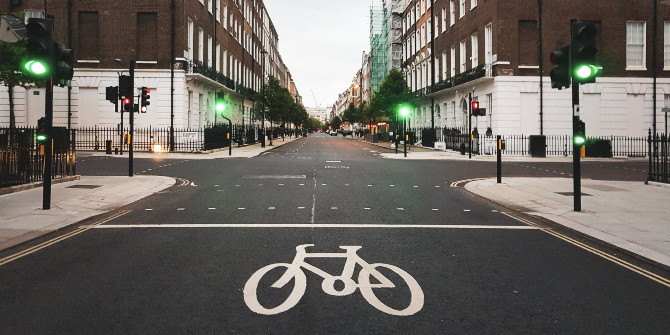 Should liberal communities accommodate communities that praise ‘illiberal’ values? After all, a state-driven imposition of a single set of values in the name of liberalism is, if nothing else, a clearly contradictory interpretation of liberalism. Forcing people to be free is just as bad as forcing them to be unfree, argues Paula Zoido-Oses.
Should liberal communities accommodate communities that praise ‘illiberal’ values? After all, a state-driven imposition of a single set of values in the name of liberalism is, if nothing else, a clearly contradictory interpretation of liberalism. Forcing people to be free is just as bad as forcing them to be unfree, argues Paula Zoido-Oses.
Last week notices appeared in Stamford Hill indicating – both in Yiddish and English – that women should only walk on a specific side of the road. After some neighbours pointed out their presence, they were removed by the council. Shortly afterwards it emerged that these signs had been placed for the orthodox Jewish community to be used during a Torah parade earlier that week – physical contact in public between men and women is strictly forbidden within this community – and were not addressed to the general public. However the confusion was not without controversy: a local councillor argued that sex segregation of this sort was ‘unacceptable’, a comment branded by a local rabbi acting as a community spokesman as ‘unhelpful’ insofar as it did not help ‘increase understanding’ of the Jewish community’s values.
This course of events illustrates clearly of some of the main questions and challenges faced by contemporary liberal democracies like the UK: are democratic liberal societies the product of a single set of values or are they defined precisely by their openness and tolerance to a diversity of lifestyles? Should liberal communities accommodate communities that praise ‘illiberal’ values? If not, how do we define what is a ‘liberal’ value or attitude, and where do we draw the line that distinguishes it from illiberal principles and attitudes? In other words: Who was right, the councillor or the rabbi? The answer is both.
The key for making plural liberal societies work is to find a balance that accommodates both liberal and illiberal values, ensuring always that it is ultimately up to the individual to choose which ones to endorse. Britain can be considered a liberal country insofar as it is generally concerned with the promotion of individual liberty and equality – regardless of which party governs. Seen from this point of view, it would not make any sense to argue that liberal societies are value-neutral. At the same time, what constitutes an ‘equal’ and ‘free’ society is never entirely clear, for these two concepts are subjected to a number of different interpretations. The challenge posed by the ambiguity of the values upon which liberalism is sustained becomes particularly visible in multi-cultural societies, with cases like the one illustrated above not uncommon.
As much as liberalism promotes the peaceful coexistence of different lifestyles and cultures – precisely on the grounds that all individuals deserve an equal share of liberty to pursue whichever values they choose to endorse – this does not mean that anything goes. This is because liberal tolerance does not equal relativism. Liberalism sets its limits precisely where practices and cultures threaten the liberal notions of liberty and equality. That is why British law supports freedom of speech or religious freedom, but also sets a typology of crimes associated to certain actions that would normally be protected under these rights – such as hate speech or religious extremism.
The problem comes when an entire community living in a liberal country endorses non-liberal values, such as what happens with the orthodox Jewish community in Stamford Hill – and this is obviously not exclusive of Jewish orthodox communities, but happens with many other religious groups too. For example, allowing a community to segregate its individuals because of their gender clashes with the liberal efforts to achieve gender equality. This is the concern voiced by the local councillor in the Stamford Hill case. On the other hand, the way in which this attitude was met with reprobation by the Jewish community illustrates how it can also be interpreted as a failure of liberal toleration. After all, a state-driven imposition of a single set of values in the name of liberalism is, if nothing else, a clearly contradictory interpretation of liberalism.
What should the state do in these cases? There is no obvious straight answer to this issue, however one suggestion springs to mind. If a multi-cultural society like the one we find in the UK wants to to call itself a liberal one as well, it should find a reasonable balance between the endorsement of liberal values and the tolerant acceptance of those communities and individuals that do not share them. In order to do this, a good rule of thumb would be to avoid coercion from any side to always make sure that individuals can choose for themselves: that is to say, nobody should be forced to be ‘free’ or ‘equal’, but neither should they be forced to be the opposite. It is just as illiberal for the Jewish community to promote gender segregation as it is for the state to forbid it. However, if any woman decides not to walk on the side of the road she has been told to –regardless of whether she is taking part in the Torah parade or not – it is definitely the liberal state’s duty to grant her right to do so.
In conclusion, it can be said that both the councillor and the rabbi were right in their concerns. Moreover, their exchange of opinions should be regarded as a sign of good political health. After all, there is no better proof that one is part of a liberal society that is accepting of plural outlooks than occasionally being offended by the attitudes and practices of others. More often than not there will not be a better solution to these small inconveniences than just putting up with them. However, it is important to make sure that everyone is able to express their views on these issues to ensure that the public discussion that keeps liberalism running is not interrupted.
Note: This article gives the views of the author, and not the position of the British Politics and Policy blog, nor of the London School of Economics. Please read our comments policy before posting.
 Paula Zoido-Oses is a PhD candidate in the European Institute in the London School of Economics. She is writing a thesis that explores Isaiah Berlin’s thought. She is particularly interested in political and moral philosophy, liberalism and value pluralism, continental philosophy and philosophy of history.
Paula Zoido-Oses is a PhD candidate in the European Institute in the London School of Economics. She is writing a thesis that explores Isaiah Berlin’s thought. She is particularly interested in political and moral philosophy, liberalism and value pluralism, continental philosophy and philosophy of history.







